Survey finds one-third of Sydney businesses will close when JobKeeper ends
The coronavirus has turned Sydney’s CBD and tourist precinct into a ghost town, with a new survey showing businesses will collapse when JobKeeper payments stop if customers don’t return.
Sydney’s central business district is a ghost town, with a new survey showing businesses will go to the wall when JobKeeper payments stop unless customers come back.
“It is like Chernobyl out there,” Rocks cafe owner Ron Danieli said.
“It’s not just my business it is the whole city that has gone quiet.”
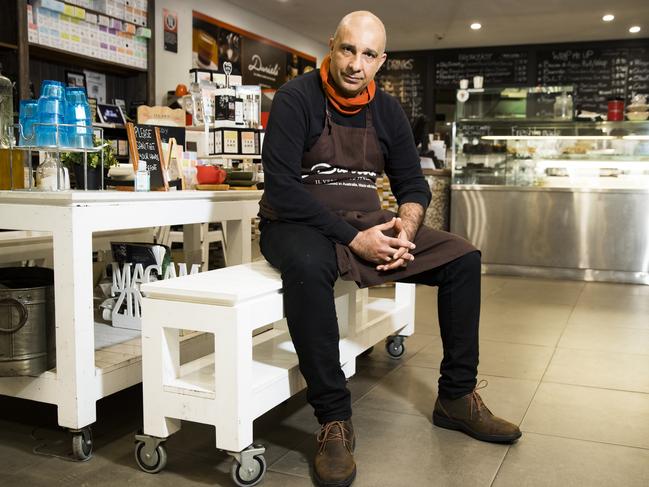
A new Business NSW survey has found that two in five businesses would be closed without the federal government’s JobKeeper payment and, chillingly, more than one in three businesses have no idea how they will survive when the payments stop in less than 90 days.
MORE NEWS
AFP calls for charges against ABC journalist
Labor’s ‘please explain’ over NSW MP’s court acceleration
Government to launch scathing attack on Chinese defence policy
“My business has dropped to just 5 per cent of what it was,” said Mr Danieli, who has axed 15 employees and has kept just one on JobKeeper.
“There are no office workers, no tourists, no people around, maybe just some cleaners or delivery people. It is just dead – a ghost town.”
His business, like half those surveyed, will be unable to maintain the hours and head count when JobKeeper payments stop, unless customers start to come back.
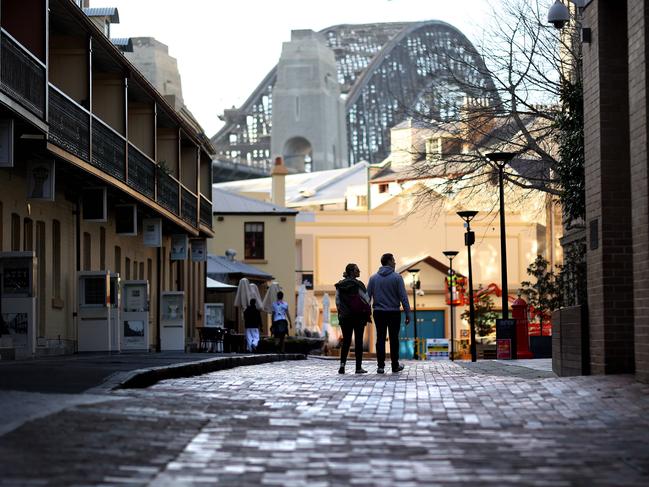
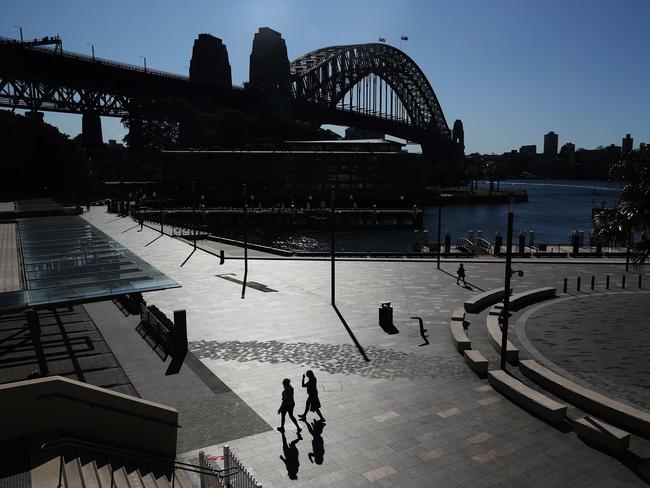
“The survey results … make for very stark reading,” Business NSW chief executive Stephen Cartwright said. “Business NSW has been saying for some time that September was going to be the month where the true impacts of the epidemic hit home, with JobKeeper set to end.
“It’s why Business NSW is supportive of a more targeted and tapered support package for business post-September, especially for those dependent on international tourists,” he said.
At the peak of the epidemic, in April, the number of people using public transport dropped by 80 per cent. Patronage is still only running at just over half normal levels.
On Wednesday the number of people allowed on public transport doubled.
A Transport for NSW spokeswoman said: “We have made unprecedented changes to the way transport works to allow as many people as possible travel back into jobs in a COVID safe way.
“This has included adding thousands of extra services and hundreds of extra staff, boosting our cleaning regime and world leading data to help customers plan ahead.”
But the latest Australian Bureau of Statistics household survey found that almost 60 per cent of people still felt uncomfortable returning to work on public transport.
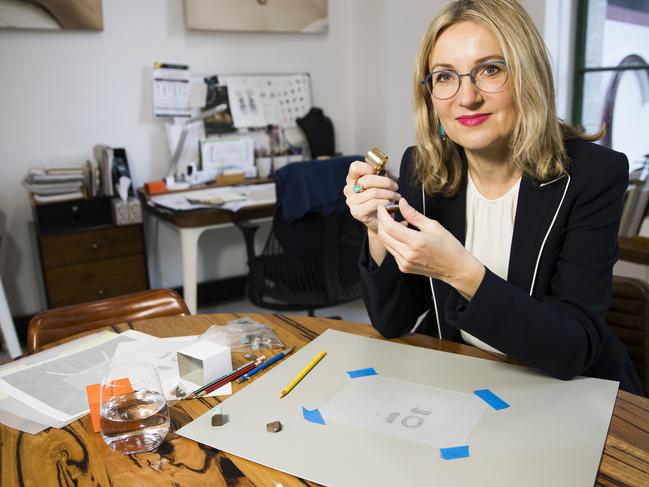
Gabriel Metcalf, chief executive of the Committee for Sydney, said: “We should require people to wear masks on public transport. If you do that, then it’s OK to have the trains and buses crowded and that makes it a lot easier for the CBD to come back.“
Getting people back into the deserted CBD is crucial for the survival of hundreds of businesses.
“It is really dire,” Sydney Business Chamber executive director Katherine O’Regan said.
“Businesses want to get the message out that they are open and that it is safe to come back and support them once again. These businesses just need customers to survive,” she said.
Opal Minded store owner Renata Bernard said: “Our revenue is down 95 per cent on similar years.”
Her design studio in the Dymocks Building in George Street is “taking baby steps” to build an online business, while her store in The Rocks has been slammed by the loss of international visitors.
“Our foot traffic used to be 50 people on a bad day and up to 100 on a good day. Now we maybe get five people in the store a week. Some days we don’t see anybody,” she said.
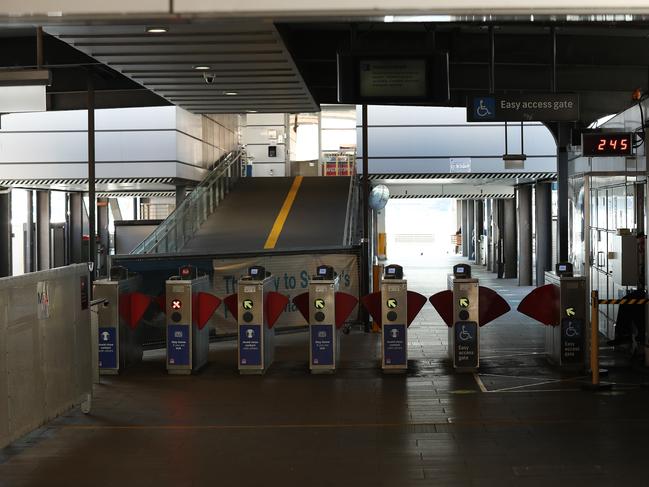
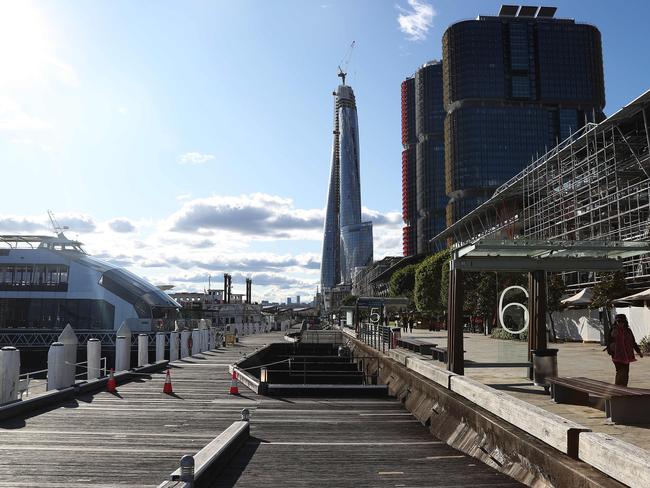
Tony Shepherd, former president of the Business Council of Australia, said the answer lay in pumping cash into Australia’s major cities, including Sydney, which provide 70 per cent of the nation’s gross domestic product.
“The stimulus package should be directed to the big cities which have felt the effect of COVID-19 disproportionately when compared with the regions,” he said.
“Investing in infrastructure for example will bring back tradies into the city and also help us build for a post coronavirus world,” he said. “It is critical that we find ways to get back into the city as soon as possible.”
$7M AID TO AVERT A CITY HEART ATTACK
Struggling businesses in the heart of Sydney have been bailed out by almost $7 million in grants from the City of Sydney.
In total, 455 grants worth $6.75 million have been awarded to businesses and community groups battling the impacts of coronavirus.
A further 199 grants totalling $2.1 million will be announced later this month.
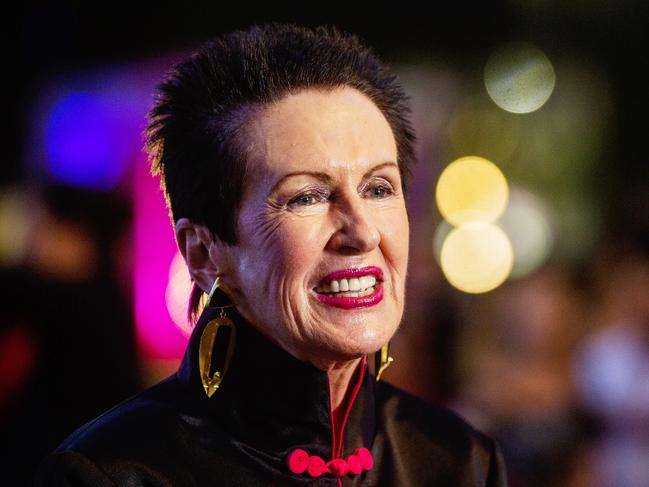
“Many workers have lost their income from the closure of cafes, restaurants, venues and gyms, and artists and arts organisations were seriously affected,” Lord Mayor Clover Moore said.
“While restrictions are now easing, many businesses and artists remain in survival mode and these grants are helping many of them to get back on their feet and move into the recovery stage.”
The grants are part of the city’s $72.5 million support package, which also included waiving rent for tenants of City of Sydney-owned buildings.
They particularly targeted businesses that could adapt to the new conditions, such as Honkas Bar+Eats in Potts Point, which was badly hit by the coronavirus pandemic.
“A few weeks before the lockdowns, people started to panic and we started to lose our functions and events bookings. Then all of sudden we were in full lockdown,” owner Hamilton Kings said.
He used the grant money to develop a Love Local app that took just 12 per cent for delivery instead of the 30 per cent charged by major online delivery services. “I knew it was going to be tough, but as long as I kept one foot in front of the other I was determined to get to the other side,” he said.
Other grants have gone to help charity organisations such as HopeStreet, which used a $41,000 grant to offer 40 households isolated by the pandemic meal kits for 10 weeks, together with online tutorials.

